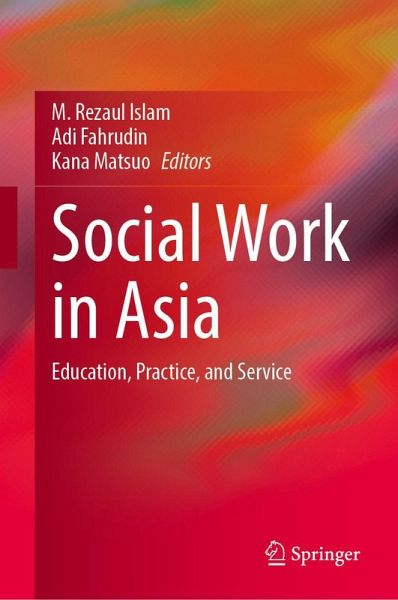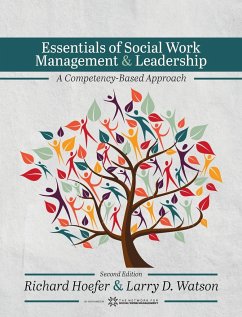
Social Work in Asia
Education, Practice, and Service
Herausgegeben: Islam, M. Rezaul; Fahrudin, Adi; Matsuo, Kana
Versandkostenfrei!
Erscheint vorauss. 15. Februar 2026
119,99 €
inkl. MwSt.

PAYBACK Punkte
60 °P sammeln!
This book examines the unique challenges, opportunities, and practices of social work across diverse Asian contexts. It bridges the gap in the literature by providing a platform for Asian scholars to share their insights and experiences. The editors have brought together contributions from leading scholars and practitioners, making this book a rich resource for understanding the multifaceted nature of social work in Asia. It delves into the cultural, social, and political factors that shape social work education and practice in the region, offering readers a nuanced understanding of how social...
This book examines the unique challenges, opportunities, and practices of social work across diverse Asian contexts. It bridges the gap in the literature by providing a platform for Asian scholars to share their insights and experiences. The editors have brought together contributions from leading scholars and practitioners, making this book a rich resource for understanding the multifaceted nature of social work in Asia. It delves into the cultural, social, and political factors that shape social work education and practice in the region, offering readers a nuanced understanding of how social workers are trained and how they operate in various contexts.
The book is structured into three main sections Social Work Education in Asia, Social Work Practice in Asia, and Social Work Services in Asia each providing an in-depth exploration of the region's distinctive social work landscape. The book offers a detailed account of how social work is taught, practiced, and evolves in response to social needs across different Asian countries. The scope is broad, covering topics such as the development of social work education in rapidly changing environments, the integration of traditional and modern social work practices, and the provision of services to marginalized populations.
Social Work in Asia is particularly important at a time when social work is increasingly recognized as a critical profession for addressing complex social issues in a rapidly globalizing world. The book is a valuable resource for readers in diverse cultural and socioeconomic settings, particularly in Asian contexts, who are interested in the development and future of social work in Asia. It would be of primary interest to academics, researchers, educators and students in social work, as well as practitioners, policymakers, NGO workers in the social services sector and other professionals who are engaged in social work education, practice, and service delivery andare interested in understanding the unique challenges and practices of the profession in Asian countries. It is also a key reference for understanding the evolving role of social work in Asia and would interest anyone looking to explore social justice, community development, and human well-being in diverse cultural contexts.
The book is structured into three main sections Social Work Education in Asia, Social Work Practice in Asia, and Social Work Services in Asia each providing an in-depth exploration of the region's distinctive social work landscape. The book offers a detailed account of how social work is taught, practiced, and evolves in response to social needs across different Asian countries. The scope is broad, covering topics such as the development of social work education in rapidly changing environments, the integration of traditional and modern social work practices, and the provision of services to marginalized populations.
Social Work in Asia is particularly important at a time when social work is increasingly recognized as a critical profession for addressing complex social issues in a rapidly globalizing world. The book is a valuable resource for readers in diverse cultural and socioeconomic settings, particularly in Asian contexts, who are interested in the development and future of social work in Asia. It would be of primary interest to academics, researchers, educators and students in social work, as well as practitioners, policymakers, NGO workers in the social services sector and other professionals who are engaged in social work education, practice, and service delivery andare interested in understanding the unique challenges and practices of the profession in Asian countries. It is also a key reference for understanding the evolving role of social work in Asia and would interest anyone looking to explore social justice, community development, and human well-being in diverse cultural contexts.












